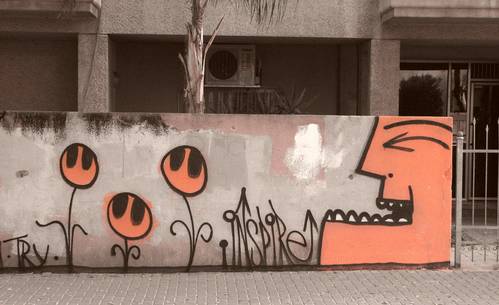It is the end of another business day, school-day, peace-keeping day. Soldiers, school children, a handful of tourists, Hasidic Jews all pile on and empty off the bus in drips, droves, coughs and sputters, as the bus navigates the stew of the afternoon rush.
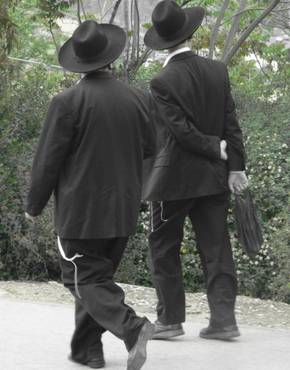
Soldiers are everywhere in Israel; more pronounced in Jerusalem, less visible in Tel Aviv. They are all young. College young. Just- out-of -high -school young. A period of military service is a mandatory part of the young Israelis’ journey into adulthood, for both men and women. This rite-of-passage speaks of the reality of a societal burden as old as the stones in the temple walls here.
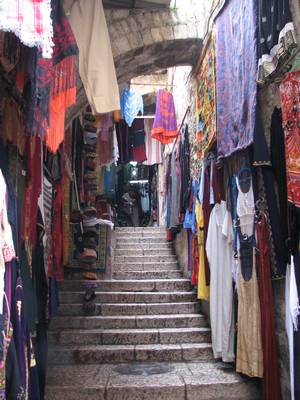 Despite the tragedies of life in a war zone, the Israeli culture is vibrant, alive, youthful, expressive, intelligent and friendly. As a stranger-in-a-strange-land, not knowing the native tongue, and unable to read signs and directions, I found myself constantly asking for help, or standing bemused at intersections, gazing at upside-down maps.
Despite the tragedies of life in a war zone, the Israeli culture is vibrant, alive, youthful, expressive, intelligent and friendly. As a stranger-in-a-strange-land, not knowing the native tongue, and unable to read signs and directions, I found myself constantly asking for help, or standing bemused at intersections, gazing at upside-down maps.
People were always helpful, often approaching me and volunteering help before I even asked. A 12-year old girl came up to me on her own, and proceeded to clarify some muddled directions given to me by fellow bus-riders. Two others, both women, offered me the use of their cell phones, when I enquired about pay-phone locations.
People were courteous about offering bus seats to the elderly and infirm. Sitting on the bus from Jerusalem to Tel Aviv, the young man beside me offered me a piece of chewing gum, which I gratefully accepted. Twenty minutes into the trip, he then offered his seat to the young female soldier standing in the aisle of the packed bus. She politely declined, but after his continued insistence she accepted.
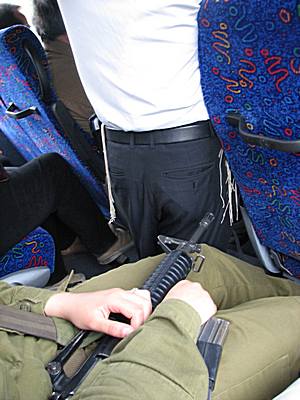 Like many of the young soldiers patrolling the streets, she carries an Uzi sub-machine gun. It rests on her lap; the butt of the gun up against my leg, the muzzle pointed inconspicuously at the rear-end of a standing passenger. I have never shared a bus seat with a sub-machine gun. It is a novel experience. The young soldier plugs in her IPod, cranks up the volume and promptly falls asleep. As the bus negotiates corners and bumps, her knees and shoulder jostle me slightly. Her right hand rests on the action of her gun.
Like many of the young soldiers patrolling the streets, she carries an Uzi sub-machine gun. It rests on her lap; the butt of the gun up against my leg, the muzzle pointed inconspicuously at the rear-end of a standing passenger. I have never shared a bus seat with a sub-machine gun. It is a novel experience. The young soldier plugs in her IPod, cranks up the volume and promptly falls asleep. As the bus negotiates corners and bumps, her knees and shoulder jostle me slightly. Her right hand rests on the action of her gun.
I gaze out the window at the passing scenery: pastoral, green, rolling hills, crumbling walls. I’m amazed at the peace I feel inside. In a kingdom of young soldiers and ancient temples, I feel the contentment of a child in a mother’s arms. The barb-wire fences, armed patrol jeeps, and this lethal, metallic thing resting beside me: surely this all means something. Surely this all speaks loudly of something.
But what this all says to me, is nothing. Nothing. Nothing.
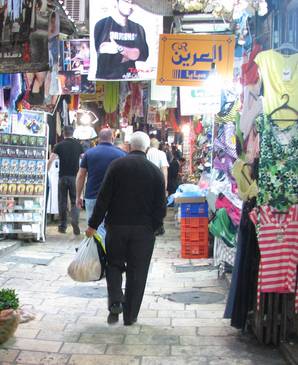 What speaks to me, more and more emphatically as time passes, is the language of the heart – the language of my heart. This is a soft language, a language known by all, a language which is the foundation of life itself.
What speaks to me, more and more emphatically as time passes, is the language of the heart – the language of my heart. This is a soft language, a language known by all, a language which is the foundation of life itself.
Its words are not spoken words, but rivers of feeling, droplets of feeling, vast oceans of feeling. Its words are a silent affirmation of the sacredness of life, the sweetness of existence.
In this bus-ride to Tel Aviv, no matter who I saw, all had this same longing in their eyes, all had that same hope, memory, prayer: the longing for life to recognize itself. A longing for the season of peace.
True peace.
A peace beyond words.




